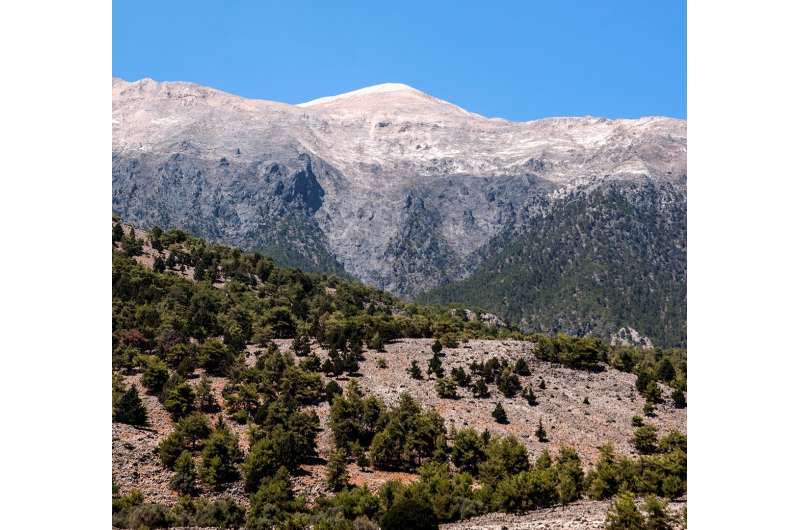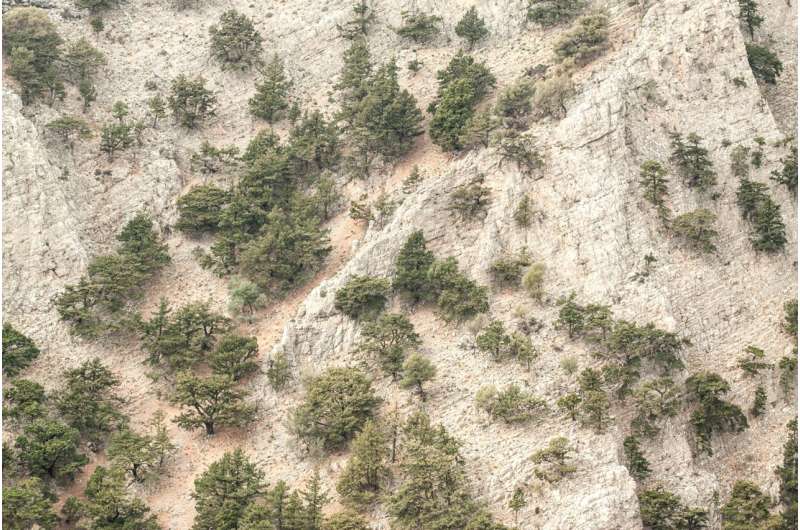Decades of climate change in the mountains do not cause a shift in the tree line

Living conditions for forests at high elevations have changed significantly in recent decades as a result of climate change. In many mountain regions, they have become more favorable above the tree line than in lower-lying forested areas. Nevertheless, climate change has not yet led to forests adapting directly to this change and shifting to higher regions. This is confirmed by a new biogeographical study of the University of Bayreuth using the example of the Mediterranean island of Crete. The scientists present their research results in the journal Forest Ecosystems. They warn of the possible consequences.
The comparison of climate data and archived aerial photographs from the years 1945 to 2015 shows that the trees in the mountain massif Lefka Ori, the "White Mountains" of Crete, have colonized the same areas for decades—and this despite the fact that their living conditions have noticeably deteriorated due to the climate-induced temperature increase during this period.
"Our study exemplifies that ecosystems do not always respond to climate change with the necessary adaptive measures to compensate for deteriorations in their site conditions. Even in many other regions of the world where impacts of global climate change are detectable, there is no evidence that disadvantaged or even endangered mountain forests are moving to higher elevations as a result. The shift in the tree line expected in models often does not take place in reality. This makes it all the more important for politicians and society in general to react to the associated dangers in good time. For example, not least in the Mediterranean region, the probability of fires or drought damage in forests below the tree line is increasing. This in turn weakens the ecologically important function of mountain forests in carbon storage. It can also worsen erosion processes. In addition, especially on Crete, many endemic species are increasingly endangered," says Prof. Dr. Carl Beierkuhnlein, who coordinated the research work.
In order to investigate the question of whether global climate change is causing a shift in tree boundaries, the Bayreuth researchers chose the Mediterranean island of Crete because the conditions for such a study were unusually favorable there. "It is a rare stroke of luck for research that aerial photographs of a mountainous region exist in relatively high resolution, which cover a period of 70 years and allow us to see with sufficient accuracy whether tree populations have changed. Using climate data and new geoinformatics methods, we were able to document decades of climate change and at the same time prove that the trees native to the mountains of Crete have not moved to higher elevations," says first author Mirela Beloiu, who earned her doctorate at the University of Bayreuth and is now a postdoctoral researcher at ETH Zurich. The research in Crete was carried out in close collaboration with the Remote Sensing Laboratory at the Institute of Applied and Computational Mathematics of the Foundation for Research and Technology Hellas (FORTH). The institute also provided the historical and recent aerial images.

In their study, the researchers identify several climatic and topographic factors that may be contributing to the persistence of Crete's mountain forests in their decades-old locations. During the study period, the mean annual temperature at the tree line increased by 0.81 degrees Celsius, while the average rainfall decreased by 170 millimeters. Increasing drought is apparently a stress factor that inhibits plant dispersal. In addition, regions above the tree line are exposed to very strong winds. As a result, young trees do not find the protection they need to establish themselves at higher elevations. "If ecosystems, such as the high mountain forests of Crete, are unable to respond to climatic changes and protect themselves adequately as a result of topographical conditions, possibilities should be explored as to how humans can strengthen their adaptation through creative nature management," says Beierkuhnlein.
More information: Mirela Beloiu et al, No treeline shift despite climate change over the last 70 years, Forest Ecosystems (2022). DOI: 10.1016/j.fecs.2022.100002
Provided by Bayreuth University



















